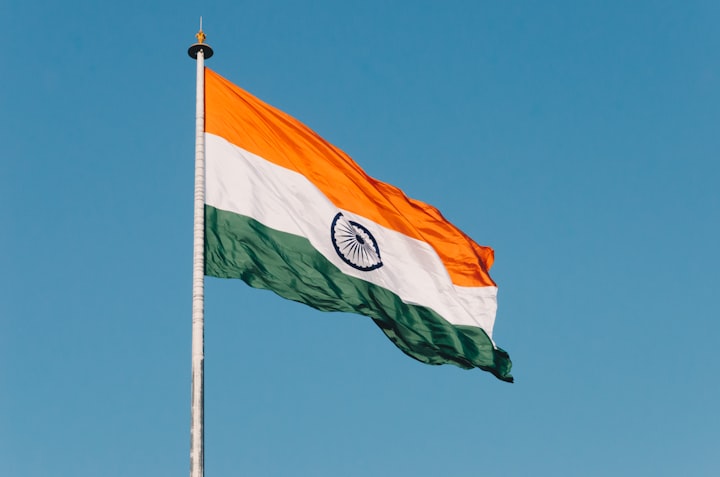
India is a vast and diverse country with a rapidly growing economy, a rich cultural heritage, and a young and dynamic population. Here are some of the key factors that could shape India's future:
Economic growth: India has been one of the fastest-growing economies in the world in recent years, with a projected GDP growth rate of around 11.5% in 2021-22, according to the IMF. The government has launched various initiatives such as Make in India, Digital India, and Startup India to encourage investment, innovation, and job creation.
Demographic dividend: India has a large and growing population, with a median age of 28 years. This young and dynamic workforce could drive innovation, entrepreneurship, and productivity in the years to come. However, it is important to ensure that this demographic dividend is harnessed effectively through education, healthcare, and skill development.
Digital transformation: India is undergoing a digital transformation, with the rapid adoption of mobile phones, internet connectivity, and e-commerce. This has the potential to transform the way people live, work, and access services, particularly in rural areas. However, there are also concerns about digital divide, privacy, and security.
Environmental sustainability: India faces several environmental challenges, such as air pollution, water scarcity, and climate change. Addressing these challenges will require a concerted effort by the government, civil society, and private sector to promote sustainable development, clean energy, and green technologies.
Geopolitical factors: India's future is also influenced by geopolitical factors such as its relations with neighboring countries, its strategic partnerships with major powers, and its role in regional and global forums. Maintaining a stable and peaceful environment, while pursuing its national interests, will be a key challenge for India in the future.
Urbanization: India is undergoing a rapid urbanization process, with around 34% of its population living in cities. This trend is expected to continue in the future, with an increasing demand for urban infrastructure, housing, and services. Managing urbanization effectively will require a holistic approach that balances economic growth, social equity, and environmental sustainability.
Healthcare: India faces several healthcare challenges, such as a high burden of communicable and non-communicable diseases, inadequate healthcare infrastructure, and low health insurance coverage. Addressing these challenges will require a significant increase in public and private investments in healthcare, as well as improving access to quality and affordable healthcare services.
Education: India has made significant progress in expanding access to education, with a literacy rate of around 77%. However, there are still significant challenges in terms of quality, equity, and relevance of education, particularly in rural areas. Improving the quality of education, promoting skill development, and enhancing access to vocational training will be critical for India's future.
Governance: India's future will depend on the quality of governance, transparency, and accountability. Ensuring a level playing field, promoting social justice, and protecting individual rights and freedoms will be key priorities for the government. Enhancing public participation, reducing corruption, and strengthening institutions will be critical for achieving these goals.
Innovation: India has a vibrant and growing innovation ecosystem, with a strong presence in sectors such as IT, pharmaceuticals, and renewable energy. Promoting innovation, research, and development, and fostering entrepreneurship and startups will be critical for India's future growth and competitiveness.
Infrastructure: India has a significant infrastructure deficit, particularly in areas such as transport, energy, and water. Addressing this deficit will require significant investments in infrastructure, as well as improving the quality and efficiency of existing infrastructure. The government's National Infrastructure Pipeline aims to invest $1.5 trillion in infrastructure over the next five years, which could help to close this gap.
Agriculture: Agriculture is a critical sector for India, providing employment to around half of its workforce and contributing around 18% of its GDP. Improving agricultural productivity, promoting sustainable farming practices, and enhancing access to markets and finance could help to transform this sector and improve the livelihoods of millions of farmers.
Gender equality: India still faces significant gender disparities, particularly in terms of access to education, healthcare, and employment. Promoting gender equality and empowering women will not only improve the well-being of women and girls but also contribute to India's overall development and growth.
Social cohesion: India is a diverse country with multiple languages, religions, and cultures. Maintaining social cohesion, promoting pluralism, and celebrating diversity will be critical for India's future unity and prosperity.
International relations: India's future is also shaped by its relations with other countries and international organizations. Building strong partnerships with its neighbors, promoting regional integration, and engaging in multilateral diplomacy could help to enhance India's global influence and contribute to its overall development.
Sure, here are a few more factors that could shape India's future:
Energy transition: India is one of the largest consumers of energy in the world, and is heavily dependent on fossil fuels such as coal and oil. However, there is growing awareness about the need to transition towards renewable energy sources, such as solar, wind, and hydro. This could help to reduce India's carbon footprint, enhance energy security, and create new opportunities for growth and innovation.
Smart cities: India is planning to develop around 100 smart cities, which would use technology and data to improve the quality of life, promote sustainable development, and enhance citizen participation. This could help to address some of the urbanization challenges that India faces, such as congestion, pollution, and inadequate services.
Digital governance: India has launched various digital initiatives such as e-governance, Aadhaar, and GST to promote digital governance, reduce corruption, and enhance efficiency. This could help to transform the way citizens interact with the government, and improve the quality and accessibility of public services.
Artificial intelligence: India is emerging as a hub for artificial intelligence (AI) research and development, with a growing number of startups, academic institutions, and multinational companies investing in this field. Promoting AI innovation and adoption could help to transform multiple sectors, such as healthcare, education, and finance.
Culture and soft power: India has a rich cultural heritage, with diverse art, music, dance, and cuisine. Promoting and celebrating this cultural diversity, both domestically and internationally, could help to enhance India's soft power and influence.
Demographics: India has a young population, with around 65% of its population under the age of 35. This could create a demographic dividend, if this youth is equipped with the right skills and opportunities. However, it could also create a demographic burden, if there are not enough jobs or education opportunities to support this large cohort.
Migration: India has a significant internal migration, with millions of people moving from rural areas to cities in search of better opportunities. Managing this migration effectively, by providing affordable housing, healthcare, and social services, could help to reduce urban poverty and improve the well-being of migrants.
Climate change: India is vulnerable to the impacts of climate change, such as increased frequency and intensity of extreme weather events, water scarcity, and sea-level rise. Addressing these challenges will require a coordinated effort to reduce greenhouse gas emissions, promote sustainable development, and enhance climate resilience.
International trade: India's future is also shaped by its trade relations with other countries, and its ability to compete in global markets. Enhancing export competitiveness, improving trade infrastructure, and diversifying export markets could help to boost India's economic growth and create new jobs.
Security: India faces various security challenges, such as terrorism, internal conflict, and cyber threats. Ensuring national security, promoting regional stability, and enhancing cyber resilience will be critical for India's future stability and prosperity.
Education: Education is a key driver of economic growth and social development. Improving access to quality education, enhancing vocational training, and promoting lifelong learning could help to equip India's workforce with the skills needed for the 21st-century economy.
Healthcare: Healthcare is another critical sector for India, with significant challenges in terms of access, affordability, and quality. Addressing these challenges will require significant investments in healthcare infrastructure, promoting preventive care, and enhancing healthcare delivery systems.
Governance: India's future is also shaped by its governance systems, including the effectiveness of its institutions, the rule of law, and the quality of public services. Improving governance, reducing corruption, and enhancing public accountability could help to build trust in the government and promote social and economic development.
Innovation: India has a growing innovation ecosystem, with a thriving startup culture, world-class academic institutions, and a strong network of entrepreneurs and investors. Promoting innovation, enhancing research and development, and fostering a culture of entrepreneurship could help to drive India's future growth and competitiveness.
Inequality: India is one of the most unequal countries in the world, with significant disparities in income, wealth, and access to basic services. Reducing inequality, promoting social inclusion, and enhancing social safety nets could help to improve the well-being of millions of Indians and promote more sustainable and inclusive growth.
Gender equality: Gender inequality is a major challenge in India, with significant disparities in education, employment, and political representation. Addressing these challenges and promoting gender equality could help to unlock the full potential of India's workforce and enhance social development.
Rural development: Rural areas in India are home to around 70% of the population and face significant challenges in terms of poverty, education, and healthcare. Enhancing rural development, promoting agricultural productivity, and improving access to basic services could help to reduce poverty and inequality and promote more inclusive growth.
Infrastructure: Infrastructure is a critical enabler of economic growth and social development. Enhancing infrastructure, such as transport, energy, and communication networks, could help to reduce transaction costs, enhance productivity, and promote regional integration.
International cooperation: India's future is also shaped by its relations with other countries and its role in the international community. Promoting multilateralism, enhancing cooperation with other countries, and promoting India's soft power could help to promote regional stability and global development.
Social cohesion: India is a diverse country, with different cultures, languages, and religions. Promoting social cohesion, enhancing interfaith harmony, and celebrating India's diversity could help to build a stronger and more resilient society.
Technology: Technology is rapidly transforming the world and creating new opportunities and challenges for India. Embracing digitalization, promoting innovation, and enhancing cybersecurity could help to unlock the potential of technology and promote India's future competitiveness.
Culture: India has a rich cultural heritage, with diverse traditions, art, and music. Promoting cultural exchange, enhancing cultural tourism, and preserving India's cultural heritage could help to promote social cohesion and promote India's soft power.
Natural resources: India is rich in natural resources, including minerals, forests, and water. Managing these resources sustainably, promoting biodiversity conservation, and enhancing environmental governance could help to promote India's future sustainability and resilience.
Health and wellness: India is home to ancient wisdom traditions that promote health and wellness, such as yoga and Ayurveda. Promoting these traditions, enhancing public health systems, and promoting preventive care could help to promote India's future well-being.
Civil society: India has a vibrant civil society, with millions of NGOs, social movements, and citizen groups working on a wide range of issues. Promoting civic engagement, enhancing public participation, and promoting transparency and accountability could help to strengthen India's democracy and promote social development.
These are some of the key factors that could shape India's future. However, as I mentioned earlier, the future is inherently uncertain and will depend on a wide range of factors, including domestic and global trends, policy choices, and societal dynamics.
About the Creator
AMIRTH KISHORE R
Amirth draws inspiration from a wide range of artists and musical styles, and their repertoire includes everything from classic jazz standards to modern pop hits.






Comments
There are no comments for this story
Be the first to respond and start the conversation.